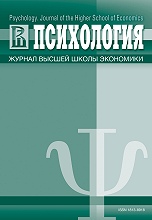Approval of Group Hierarchy: Russian Version of Social Dominance Orientation Scale
Abstract
The article describes the Russian version of Social Dominance Orientation Scale (Pratto et al., 1994). The structure, reliability and validity of three variants of the scale were studied: scale for measurement of general social dominance (Study 1), of dominance in interethnic (Study 2) and international (Study 3) relationships. Two thousand thirty five respondents took part in the studies (N1 = 512, N2 = 204, N3 = 1319). They filled in full versions of the scales, which comprised 16 items. Respondents were to agree or disagree with each statement on a 7-score scale (from 1 – “completely disagree” to 7 – “completely agree”). Confirmatory factor analysis demonstrated that the model, where items formed 2 closely interrelated sub-factors, better fitted the data, than models, where all items were summed in one scale. Moreover, it was found that models, which comprised 10 items, better fitted the data, than models with 16 items (Study 1: χ2 = 121.737*, CFI = 0.967, RMSEA = 0.050; Study 2: χ2 = 42.411, CFI=0.988, RMSEA =0.035; Study 3: χ2 = 134.225, CFI = 0.967, RMSEA = 0.047). Further analysis demonstrated that 10-items models have good indices of configural validity. In whole, the acquired results show that the short versions of the Social Dominance Orientation Scales correspond to the theoretical model, are reliable, valid and can be used in empirical research.
Downloads
References
2. Etchezahar, E., Prado-Gasco, V., Jaume, L., & Brussino, Y. S. (2014). Validation argentina de la escala de orientacion a la dominancia social. Revista Latinoamericana de Psicologta, 46, 35-43. https://doi.org/10.1016/S0120-0534(14)70004-4 (in Spanish)
3. Everett, J. A. C. (2013). The 12 Item Social and Economic Conservatism Scale (SECS). PLoS ONE, 8(12), e82131. https://doi.org/10.1371/journal.pone.0082131
4. Feather, N. T., & McKee, I. R. (2012). Values, right-wing authoritarianism, social dominance orientation, and ambivalent attitudes toward women. Journal of Applied Social Psychology, 42, 2479- 2504.
5. Ho, A. K., Sidanius, J., Kteily, N., Sheehy-Skeffington, J., Pratto, F., Henkel, K. E Stewart, A. L. (2015). The nature of social dominance orientation: Theorizing and measuring preferences for intergroup inequality using the new SDO7Scale. Journal of Personality and Social Psychology, 109, 1003-1028. https://doi.org/10.1037/pspi0000033
6. Ho, A. K., Sidanius, J., Pratto, F., Levin, S., Thomsen, L., Kteily, N., & Sheehy-Skeffington, J. (2012). Social dominance orientation: Revisiting the structure and function of a variable predicting social and political attitudes. Personality and Social Psychology Bulletin, 38, 583-606.
7. Hodson, G., & Dhont, K. (2015). The person-based nature of prejudice: Individual difference predictors of intergroup negativity. European Review of Social Psychology, 26, 1-42.
8. Jylha, K. M., & Akrami, N. (2015). Social dominance orientation and climate change denial: The role of dominance and system justification. Personality and Individual Differences, 86, 108-111.
9. Li, Z., Wang, L., Shi, J., & Shi, W. (2006). Support for exclusionism as an independent dimension of social dominance orientation in mainland China. Asian Journal of Social Psychology, 9, 203-209. https://doi.org/10.1111/j.1467-839X.2006.00198.x
10. Livi, S. Leone, L., Falgares, G., & Lombardo, F. (2014). Values, ideological attitudes and patriotism. Personality and Individual Differences, 64, 141-146.
11. Mifune, N., & Yamagishi, T. (2008). The validity ofJapanese version of social dominance orientation. Poster presented in the 72nd annual meeting of Japanese Psychological Association. 72nd Annual Convention of the Japanese Psychological Association, Hokkaido University, Sapporo, September 19, 2008.
12. Mosso, C., Briante, G., Aiello, A., & Russo, S. (2013). The role of legitimizing ideologies as predictors of ambivalent sexism in young people: Evidence from Italy and the USA. SocialJustice Research, 26, 1-17.
13. Perry, R., Sibley, C. G., & Duckitt, J. (2013). Dangerous and competitive worldviews: A meta-analysis of their associations with social dominance orientation and right-wing authoritarianism. Journal of Research in Personality, 47, 116-127.
14. Pratto, F., Sidanius, J., & Levin, S. (2006). Social dominance theory and the dynamics of intergroup relations: Taking stock and looking forward. European Review of Social Psychology, 17, 271-320. https://doi.org/10.1080/10463280601055772
15. Pratto, F., Sidanius, J., Stallworth, L. M., & Malle, B. F. (1994). Social dominance orientation: A personality variable predicting social and political attitudes. Journal of Personality and Social Psychology, 67, 741-763. https://doi.org/10.1037/0022-3514.67.4.741
16. Sibley, C. G., & Duckitt, J. (2008). Personality and prejudice: A meta-analysis and theoretical review. Personality and Social Psychology Review, 11, 248-279.
17. Sibley, C. G., Robertson, A., & Wilson, M. S. (2006). Social dominance orientation and right-wing authoritarianism: Additive and interactive effects. Political Psychology, 27, 755-768.
18. Sidanius, J., Pratto, F., van Laar, C., & Levin, S. (2004). Social dominance theory: Its agenda and method. Political Psychology, 25, 845-880.





